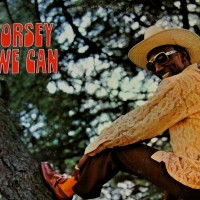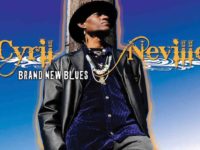Zigaboo Modeliste, fresh off his fourth solo album for JZM Records, takes us inside the emotional reunion with bassist George Porter Jr., a fellow co-founder of the Meters, on the New Life project — which also features guest turns by guitarist Shane Theriot (Neville Brothers), percussionist Bill Summers (Herbie Hancock, the Headhunters), organist Joe Krown (Clarence “Gatemouth” Brown) and trumpeter Mic Gillet (Tower of the Power).
We also discuss how Modeliste’s celebratory writing style has continued to grow, and why he never expected one of the Meters’ most memorable sides to see wide release …
“FUNKIFY YOUR LIFE,” with the Meters (NEW DIRECTIONS,1976): Co-written with guitarist Leo Nocentelli, bassist George Porter, keyboardist Art Neville and conga player Cyril Neville, this swamp-funk David Rubinson-produced masterpiece illustrates how far the band had come since the days of soul-filled 45-length instrumental blasts like “Cissy Strut.” “Funkify Your Life” later became the title track of a gala two-disc retrospective on the Meters put out by Rhino in 1995.
ZIGABOO MODELISTE: We were always trying to reinvent ourselves. We started out as a primitive instrumental group, just the four of us — and that was the thing during that time. But after you do that for a couple of albums, if you have a record company that’s flexible enough, maybe you can take that and add on to it. This opportunity lent itself to that. We had a new producer (after years with Allen Toussaint), who had done the Pointer Sisters. We just opened our minds. David did a great job putting it all together. I learned a lot of from him; that helped me put my own records together later. He used the Tower of Power horn section, which was brilliant. They knew how to play. So that’s what I did, too!
[SOMETHING ELSE! INTERVIEW: Zigaboo Modeliste talks about key moments with the Meters, hanging with the Rolling Stones, and how he taught himself to play by not playing.]
“DESITIVELY BONAROO,” with Dr. John (DESITIVELY BONNAROO, 1974): The second of two consecutive major collaborations with the Meters, after Dr. John’s breakthrough recording In the Right Place, this song cycle was recently recreated with all of the original participants at the namesake Bonnaroo Festival.
ZIGABOO MODELISTE: The way we did it was, it was only the Meters with Dr. John, then they added the horns and the rest. My experience was beautiful, because all we were doing was laying down tracks. I had no idea what it would sound like! We had been working with Dr. John off and on before then. So, we were all geared up for whatever he needed us to do. Unfortunately, we didn’t have anything to do with the writing, which I regret. We probably would have come up with something even more fantastic. But that was only available to Allen Toussaint and Dr. John. They were the two important elements and a third important element was the Meters. I thought that what we did was excellent, though. The record company did not know how to promote Dr. John at that point, though. They really dropped the ball. That was a good album.
[SOMETHING ELSE! REWIND: Even today, there’s really no roadmap for the crazy-eyed co-mingling of R&B, jazz, island beats, blues, boogie funk and hoodoo whackadoo splashed across ‘Desitively Bonnaroo.’]
“KEEP ON GROOVIN,’” solo (NEW LIFE, 2011): A fun reunion with former rhythm section partner George Porter Jr., bassist and fellow co-founder of the Meters. Together, the formed the unshakeable foundation of earthy, downhome funk that helped differentiate their band from the careening, more urban style of James Brown and Sly Stone.
ZIGABOO MODELISTE: It’s always a pleasure to play with George Porter. He’s just a fantastic bass player. Over the years, we spent a lot of time together, so it was like coming home. I had to call George up, and he’s so busy that he’s hard to get. It worked out, though, and he was available. He was gracious enough to come down and overdub that track. We didn’t actually play it together simultaneously, because I had somebody else who had a bass line on the track. He knew just from playing with me for years and years what I wanted the bass to actually do. He nailed it. I was really, really happy to have him.
“DOODLE-OOP (THE WORLD IS A BIT UNDER THE WEATHER),” with the Meters (single, 1971): A Top 50 R&B record for the Meters that continued a string of early hits, including the Top 10 smashes “Cissy Strut” and “Sophisticated Cissy” in 1969, and the No. 11 hits “Look-Ka Py Py” “Chicken Strut” in 1970. It was perhaps the first widely heard message song from Modeliste and Co., an impulse toward uplifting and healing song subjects that continues with the drummer’s current New Life project.
ZIGABOO MODELISTE: That’s one of things that I try to stick to. I see all of these other huge artists, and I wish the best for them, but it’s like they get so big and they forget about what’s important. Every word they utter, people listen to it. Why not think about making one song, at least one, that’s a conscious effort to empower people? That’s something they should be thinking about doing. If they don’t know how, they should get somebody to write it. If I can help somebody in some kind of way, if the lyrics touch you or the music is something you embrace, then I feel like I am a winner.
“THEY ALL ASK’D FOR YOU,” with the Meters (single, 1975): Reportedly adapted from a real-life session of the dozens, this Modeliste-sung romp has become a kind of theme song for New Orleans’ Audubon Zoo — which is referenced early on in the lyrics. Thing is, the drummer says this band-written track wasn’t supposed find its way onto the radio.
ZIGABOO MODELISTE: It was something we were doing, just a joke. We were clowning in the studio. It was just something the Meters were supposed to have, a funny memory. The producer (Toussaint), he did not ask if we wanted to have it on there. He just put it on there. We were powerless to do anything, because we signed such bad contracts. I was happy after they released it, though, because any day you go to the Audubon Zoo, you will hear it all day long. I was happy to be involved with it, in that respect. You know, it doesn’t matter about the age group, anybody can sing that song. Nobody is left out. I see kids all the time who know the words, old folks know the words. Whenever I go to New Orleans, I hear it at least 50 times — coming out of shops and cars. It’s a real tribute to the Meters’ success and what we accomplished.
- Nick DeRiso’s Best of 2015 (Rock + Pop): Death Cab for Cutie, Joe Jackson, Toto + Others - January 18, 2016
- Nick DeRiso’s Best of 2015 (Blues, Jazz + R&B): Boz Scaggs, Gavin Harrison, Alabama Shakes - January 10, 2016
- Nick DeRiso’s Best of 2015 (Reissues + Live): John Oates, Led Zeppelin, Yes, Faces + others - January 7, 2016





Pingback: Die Meter – Wikipedia – Enzyklopädie